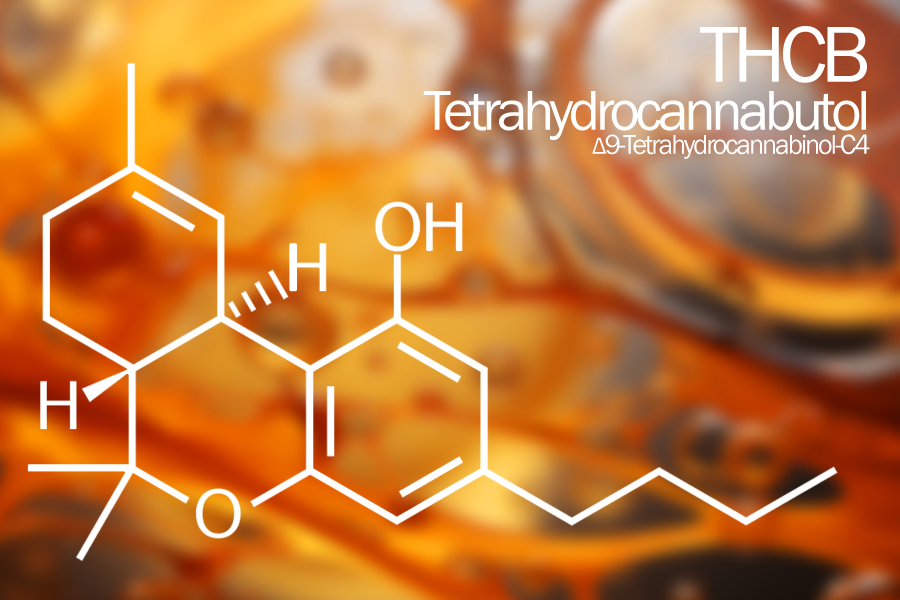
What is THCB?
As we venture further into the realm of cannabinoids and their potential applications, this unique molecular family continues to expand. One such molecule that has recently entered the spotlight is Delta-9-tetrahydrocannabutol, more commonly known as THCB.
With limited information readily available on THCB, this post aims to provide a comprehensive analysis of this newly discovered cannabinoid, its potential effects, legality, particularly in the UK, its associated products, and its global usage.
Please note: THCB is a psychoactive cannabinoid. It is illegal under the Psychoactive Substances Act 2016.
What is THCB?
THCB is a phytocannabinoid found in the Cannabis sativa plant. Its structure is closely related to THC (delta-9-tetrahydrocannabinol), the most well-known cannabinoid recognized for its potent psychoactive effects.
This structural similarity to THC has brought about substantial interest in understanding the properties of THCB. However, it's worth noting that research on this novel compound is still in its infancy, and most of the information we have thus far is derived from preliminary studies.
Is THCB Psychoactive?
'Psychoactive' typically refers to whether a compound can produce a 'high' or notable alteration in perception, mood, or consciousness, as seen with THC. Given the structural similarities to THC, it is postulated that THCB may exhibit some level of psychoactivity.
Preliminary studies have indicated a stronger binding affinity of THCB to the CB1 receptors in the brain compared to THC, which could imply potentially more potent effects. However, without conclusive human trials, it remains unclear exactly what psychoactive properties THCB may possess.
What Are the Potential Effects of THCB?
While research on THCB's effects is ongoing, initial studies indicate that it may share some properties with its relative, THC. Preliminary tests on animals have shown the potential for pain relief, anti-inflammatory properties, and deeper sleep. However, these findings are early stage and more research is needed to confirm these effects in humans.
As with all cannabinoids, it's important to remember that individual responses can vary greatly depending on numerous factors, including dosage, individual physiology, and the presence of other cannabinoids and terpenes.
Is THCB Dangerous?
The safety profile of THCB is still under investigation. The key challenge in understanding the potential dangers or side effects of THCB lies in the lack of extensive research and human trials.
This limitation makes it difficult to definitively state whether THCB is dangerous. However, it's worth noting that as with any substance, misuse or overuse could potentially result in adverse effects. Therefore, it is always recommended to approach new cannabinoids like THCB with caution and consult a healthcare professional prior to use.
What Kinds of THCB Products Are There?
With the increasing interest in cannabinoids, it wouldn't be surprising to see a range of THCB products emerge in the market soon. However, as of now, due to its recent discovery and the lack of extensive research, THCB products are not yet widely available.
Once commercialisation begins, we can expect a range of products similar to what is available for other cannabinoids. This could include THCB oils, capsules, edibles, topical creams, and potentially even THCB-dominant cannabis strains.
Legality of THCB in the UK
Because THCB is a psychoactive cannabinoid it is illegal under the Psychoactive Substances Act 2016.
If you're an individual or a business working with cannabinoids, it's essential to monitor any changes to these laws and consult with a legal expert if needed, particularly as more research emerges about THCB's potential effects and psychoactivity.
Other non-psychoactive cannabinoids like CBD are legal, provided they contain no more than 0.2% THC.
THCB Usage Around the World
THCB, being a newly discovered cannabinoid, is not yet a household name in the global cannabis landscape. However, interest is growing, and with it, the potential for increased adoption and use is on the horizon.
In North America, particularly in regions where cannabis has been decriminalized or legalized, like Canada and several states in the U.S., there's a high probability that THCB could make its way into the mainstream market soon. Consumers in these regions have shown an eagerness to experiment with new cannabinoids, which could drive demand for THCB. Nevertheless, widespread use will largely hinge on further research affirming its safety and potential therapeutic benefits.
In Europe, the scenario varies significantly between countries due to differing cannabis laws. In countries like the Netherlands, where cannabis use is tolerated, THCB could gain popularity once its psychoactive potential and safety profile are better understood. The same applies to Spain, which has a thriving cannabis social club culture. However, in countries with more stringent cannabis laws, such as France or Sweden, THCB's acceptance could face considerable hurdles unless changes to legislation occur.
In Asia and the Middle East, where many countries have strict anti-cannabis laws, the acceptance and usage of THCB are likely to be minimal at present. However, shifts are occurring. For instance, Thailand has recently made strides in cannabis legalization for medical use, which could open the door for cannabinoids like THCB in the future.
Conclusion
While THCB is a promising cannabinoid with potential therapeutic properties, it's essential to remember that our understanding of this compound is still in its early stages. As research progresses, we can expect a clearer picture of THCB's effects, safety profile, and potential applications to emerge.
For now, if you're considering exploring THCB or any other new cannabinoid, remember to do so responsibly. Always stay informed about the latest research and legal status, start with a low dose, monitor your response, and consult with a healthcare professional as needed.
By expanding our knowledge and understanding of cannabinoids like THCB, we take another step towards unlocking the full therapeutic potential of the Cannabis sativa plant, providing new possibilities for health and well-being. As we continue to delve into this fascinating world, one thing is clear: the story of cannabis is far from over, and each new chapter brings exciting potential.


















